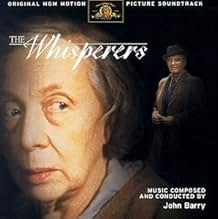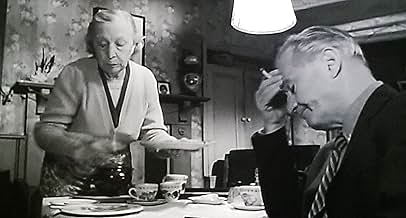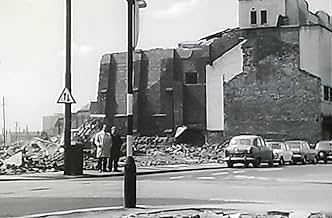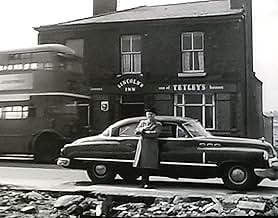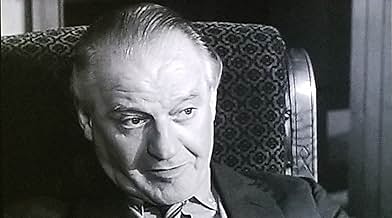AVALIAÇÃO DA IMDb
7,1/10
1,6 mil
SUA AVALIAÇÃO
Adicionar um enredo no seu idiomaA lonely elderly Englishwoman talks to herself and hears voices talking about her.A lonely elderly Englishwoman talks to herself and hears voices talking about her.A lonely elderly Englishwoman talks to herself and hears voices talking about her.
- Direção
- Roteiristas
- Artistas
- Indicado a 1 Oscar
- 9 vitórias e 4 indicações no total
- Direção
- Roteiristas
- Elenco e equipe completos
- Produção, bilheteria e muito mais no IMDbPro
Avaliações em destaque
What really hooked me into this film, right from the first shots of the opening credits, was the fantastic photography in here. This is one beautiful-looking black-and-white film.
The superb work of photographer Gerry Turpin and Director Bryan Forbes made this bleak story all the better with just the right amount of closeups and odd-angle shots, and some striking film noir-like light and shadows. This would be a stunner in high-definition.
Then, of course, you have the wonderful acting by Edith Evans, who plays the central character, "Mrs. Ross." Some think she got robbed out of the Oscar the year this was eligible, and they may be right. Not to be overlooked was Eric Portman, who entered the movie about halfway through and he, too, was riveting. He played "Archie," the long-departed husband who comes back (reluctantly) to his now-ailing wife. Portman almost takes over the spotlight in the second-half of the film, but it's still Evans' being the one you'll remember most and the undisputed star of the film.
Yes, the story is a bit sordid in a few spots but I didn't find it depressing, as others have. Instead, I just marveled at the camera-work and considered the story a good character study.
It's a pity this film isn't better-known. It deserves a bigger audience.
The superb work of photographer Gerry Turpin and Director Bryan Forbes made this bleak story all the better with just the right amount of closeups and odd-angle shots, and some striking film noir-like light and shadows. This would be a stunner in high-definition.
Then, of course, you have the wonderful acting by Edith Evans, who plays the central character, "Mrs. Ross." Some think she got robbed out of the Oscar the year this was eligible, and they may be right. Not to be overlooked was Eric Portman, who entered the movie about halfway through and he, too, was riveting. He played "Archie," the long-departed husband who comes back (reluctantly) to his now-ailing wife. Portman almost takes over the spotlight in the second-half of the film, but it's still Evans' being the one you'll remember most and the undisputed star of the film.
Yes, the story is a bit sordid in a few spots but I didn't find it depressing, as others have. Instead, I just marveled at the camera-work and considered the story a good character study.
It's a pity this film isn't better-known. It deserves a bigger audience.
The supremely versatile film-maker, Bryan Forbes directs a remarkably bleak and eerily unsettling treatise on the multifarious cruelties inherent with old age. 'The Whisperers' (1967) remains a forceful, extraordinarily persuasive work of melancholic cinema that has lost none of its considerable power to enthral and perturb with equally forceful cinematic rigour! It would be greatly remiss of me if I failed to praise maestro, John Barry's truly magnificent score!
No small admirer of, Brian Forbes's dazzlingly ecclectic cinema, I passionately believe that 'The Whisperers' remains one of his finest films. Exquisitely shot, with exemplary performances, the magisterial, Edith Evans on positively mesmeric form, movingly delivering one of cinema's most genuinely affecting performances. It is tantamount to a cultural travesty that this monochrome masterpiece has long been allowed to mildew away in undeserved obscurity. 'The Whisperers', along with the equally unsettling existential nightmare 'Séance on a Wet Afternoon' are arguably two of the more compelling dramas produced during the UK's dynamic Renaissance of the 1960s. Hopefully some tasteful, forward-thinking celluloid archivist might soon release this exceptionally fine film on a restored, features-packed Blu-ray!
No small admirer of, Brian Forbes's dazzlingly ecclectic cinema, I passionately believe that 'The Whisperers' remains one of his finest films. Exquisitely shot, with exemplary performances, the magisterial, Edith Evans on positively mesmeric form, movingly delivering one of cinema's most genuinely affecting performances. It is tantamount to a cultural travesty that this monochrome masterpiece has long been allowed to mildew away in undeserved obscurity. 'The Whisperers', along with the equally unsettling existential nightmare 'Séance on a Wet Afternoon' are arguably two of the more compelling dramas produced during the UK's dynamic Renaissance of the 1960s. Hopefully some tasteful, forward-thinking celluloid archivist might soon release this exceptionally fine film on a restored, features-packed Blu-ray!
Somerset Maugham once made this observation about poverty: "You will hear people say that poverty is the best spur to the artist. They have never felt the iron of it in their flesh. They do not know how mean it makes you. It exposes you to endless humiliation, it cuts your wings, it eats into your soul like a cancer."
The spirit of what he said pervades this disturbing film. No doubt this work would have to resonate more in Britain, but even 50-years later, unemployment, abandonment of the elderly, and welfare subsistence are fairly universal maladies of the Western World.
"The Whisperers" is not a comfortable experience. A disturbed old woman, Mrs Ross (Edith Evans), who lives alone is slowly losing her grip on reality, she lives in impoverished circumstances and is dependent on welfare. When she accidentally comes into a little money, she is preyed on like a wounded animal in the jungle. Even her son, Charlie (Ronald Fraser), and her estranged husband, Archie (Eric Portman), take advantage of her.
This is more than a performance by Edith Evans; when it's over, you believe Mrs Ross existed.
She lives in a society where ruthless opportunists abound. However, the story is not devoid of decent people; her young neighbour and especially the understanding Mr Conrad (Gerald Sim) at the welfare office redeem what would be a very jaundiced look at modern life.
Bryan Forbes was a man of many talents: actor, writer and director, but this film would have to be at the pinnacle of his achievements. The film boasts brilliant photography and real locations. You can almost smell the rising damp and cheap tobacco, and feel the mud spattered on your shoes - not to mention the edge of the cut-throat razors in one disturbing scene; powerful imagery in the impressive tradition of British 'kitchen sink dramas'.
The film has a score by John Barry. Although I didn't see this film until 50 years after it was made, I knew the theme far earlier from a Barry compilation album, and always wanted to see the film it went with. This was before Barry settled into that languid style when many of his scores seemed interchangeable. During the 60's and 70's he was one of the most experimental composers. He used a harpsichord here in a small-scale work, which suited the poignancy and bleakness of the story.
Although dramatised, the film shows a slice of modern life, but from a rather dispassionate point-of-view and that makes it hit home all the more.
The spirit of what he said pervades this disturbing film. No doubt this work would have to resonate more in Britain, but even 50-years later, unemployment, abandonment of the elderly, and welfare subsistence are fairly universal maladies of the Western World.
"The Whisperers" is not a comfortable experience. A disturbed old woman, Mrs Ross (Edith Evans), who lives alone is slowly losing her grip on reality, she lives in impoverished circumstances and is dependent on welfare. When she accidentally comes into a little money, she is preyed on like a wounded animal in the jungle. Even her son, Charlie (Ronald Fraser), and her estranged husband, Archie (Eric Portman), take advantage of her.
This is more than a performance by Edith Evans; when it's over, you believe Mrs Ross existed.
She lives in a society where ruthless opportunists abound. However, the story is not devoid of decent people; her young neighbour and especially the understanding Mr Conrad (Gerald Sim) at the welfare office redeem what would be a very jaundiced look at modern life.
Bryan Forbes was a man of many talents: actor, writer and director, but this film would have to be at the pinnacle of his achievements. The film boasts brilliant photography and real locations. You can almost smell the rising damp and cheap tobacco, and feel the mud spattered on your shoes - not to mention the edge of the cut-throat razors in one disturbing scene; powerful imagery in the impressive tradition of British 'kitchen sink dramas'.
The film has a score by John Barry. Although I didn't see this film until 50 years after it was made, I knew the theme far earlier from a Barry compilation album, and always wanted to see the film it went with. This was before Barry settled into that languid style when many of his scores seemed interchangeable. During the 60's and 70's he was one of the most experimental composers. He used a harpsichord here in a small-scale work, which suited the poignancy and bleakness of the story.
Although dramatised, the film shows a slice of modern life, but from a rather dispassionate point-of-view and that makes it hit home all the more.
"The Whisperers" is the kind of movie you curl up with on a rainy day. I had the fortune of catching it on Turner Classic Movies once and I was mesmerized. Edith Evans gives a completely convincing performance as a lonely old woman living in a run down apartment (or flat) in London. Clearly, she is bordering on senility or dementia as she imagines voices coming from faucets, her radio, and suspects her neighbors are spying on her. She imagines herself an heiress (as she frequently reminds her social worker at the Public Assistance Board) waiting for her inheritance to come through. It is sad to see her begging for a new pair of shoes or a pound to get food. Before the film ends, you will find yourself concerned for her well being as though she is a real person. Perhaps it is the realization that many old people the world over live this very existence. I had the good fortune to find this movie available on video through Movies Unlimited. Act fast as it is out of print. Perhaps it will be available on DVD in the future.
this is a great performance another example of the academy awards not giving it to the rightful owner...i love kate hepburn but lets face it THIS performance deserved it...this is one of thoses performances that you are so grateful that film can perserve...edith evans is so great and yet so sad in the starring role... it is a most depressing film and one that is not to be seen if one is depressed but for an actor to see a great actress in her glory this is one of those experiences indeed...i always admired edith evans but never more than in this picture..of aging and how awful it can be to anyone so treat yourself to an unusual experience and see the whispers...
Você sabia?
- CuriosidadesThe director Bryan Forbes and Nanette Newman, who played the upstairs neighbor, were husband and wife.
- Erros de gravaçãoThe old kitchen curtain is shown in scene after Archie leaves, while Margaret is moping around the apartment. The new curtains are shown again after she returns from seeing Mr. Conrad at the National Assistance Board.
- Citações
Archie Ross: What kind of job might it be, sir?
Mr. Conrad: Doorman at a cinema.
Archie Ross: Oh, wonderful. Nice and healthy and in the open.
Mr. Conrad: The healthiest jobs, Mr. Ross, are the ones you keep.
- ConexõesVersion of ITV Play of the Week: The Whisperers (1961)
- Trilhas sonorasShall We Gather at the River?
(uncredited)
Written by Robert Lowry
Performed by Edith Evans and mission attendees
Principais escolhas
Faça login para avaliar e ver a lista de recomendações personalizadas
- How long is The Whisperers?Fornecido pela Alexa
Detalhes
- Tempo de duração1 hora 46 minutos
- Cor
- Mixagem de som
- Proporção
- 1.66 : 1
Contribua para esta página
Sugerir uma alteração ou adicionar conteúdo ausente

Principal brecha
By what name was The Whisperers (1967) officially released in Canada in English?
Responda

